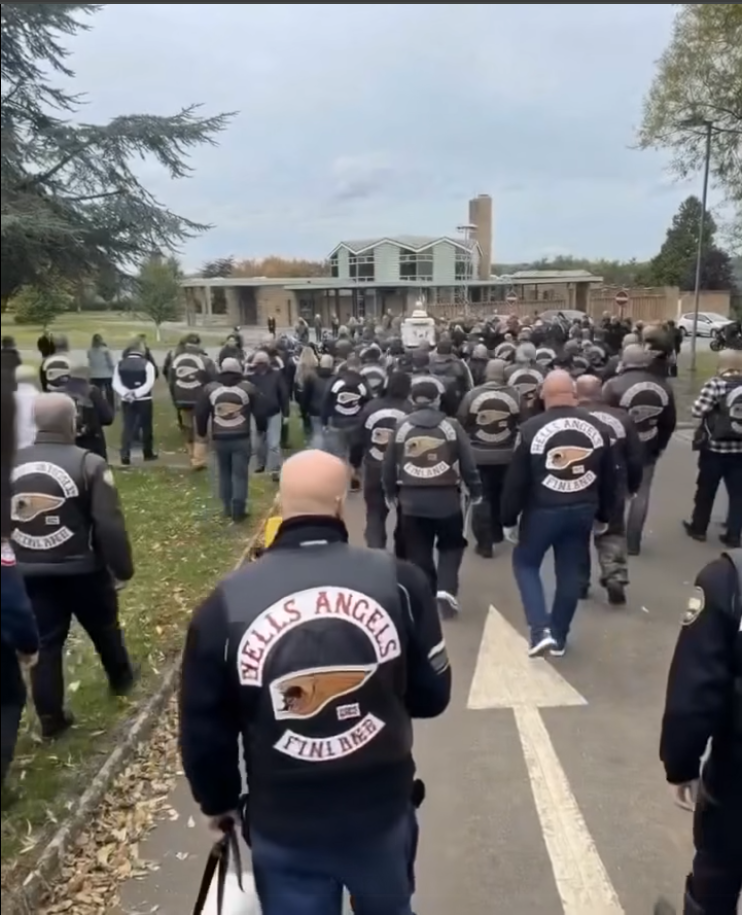My son, Maddox, was seventeen when it happened. Quiet kid. Always wore the same beat-up leather jacket, loved sketching in notebooks, and took more care of our old dog than most people do of their own siblings.
He wasn’t the kind of kid you’d expect to get in trouble. But he rode his bike everywhere—rain, snow, didn’t matter. Said it helped him think.
That night, he was biking home from his after-school job. Just three blocks away when a car full of teenagers decided to play some stupid game—tailgating a cyclist, revving loud, trying to scare him.
They “didn’t mean to hit him.” That’s what they said. Over and over. Didn’t stop them from driving off.
Didn’t save Maddox.
The funeral was small. At least, it was supposed to be. Just family. A few close friends. Some classmates.
Until the bikes started rolling in.
First three. Then twelve. Then twenty. By the time the service started, there were over fifty leather-jacketed, heavy-booted bikers parked along the street like a steel army. Every single one of them quiet, respectful, heads bowed.
And every single one of them had known Maddox.
Turns out, he’d been sketching portraits at a local garage every weekend. Said it was “just something cool to do.” They saw him as a little brother. A good soul. Someone who sat with them when they were having bad days, asked questions about their lives when no one else did.
They showed up not to intimidate.
They showed up to protect his name.
The four teens who caused the crash were there, forced by their parents. One of them smirked when they arrived.
He didn’t smirk for long.
Because these bikers didn’t touch them. Didn’t threaten them.
They spoke.
One by one, they shared who Maddox was to them. The time he stayed late to help one rebuild a bike. The drawings he gave to a rider’s daughter. The kindness he showed—without needing to.
And by the time the last man finished, those four teens were sobbing. Not from fear.
From shame.
I thought that would be the end of it. A powerful moment, sure. But funerals come and go. Life keeps moving—at least, for everyone else.
Except it didn’t end there.
Two weeks after the funeral, I got a knock on the door. It was early—too early for a casual visit. I opened it to find one of the teens from the accident. The lanky one. His name was Rowan, I think. His hands were shaking.
“I know I don’t deserve your time,” he said, voice cracking, “but I wanted to return this.”
He handed me a sketchbook.
Maddox’s.
Tears stung my eyes before I even opened it.
“We found it under the seat,” he admitted. “After… after we stopped lying to ourselves. We didn’t mean for any of it, but we didn’t stop, either. And I’ve been trying to figure out how to be better since.”
I opened the book slowly.
Maddox had drawn them.
The boys. The car. The road.
But he hadn’t drawn it out of anger.
The pages were full of understanding. The one labeled “Rowan” showed a kid slumped over a drum set, headphones on, eyes closed. It was him. A version of him I never would’ve imagined. Soft. Human. The next page was another of the boys—grinning with a camera in hand, like he was mid-joke.
It hit me all at once—Maddox knew them.
He had drawn them like he saw them. Not as bullies or threats, but as people. Messy, complicated, flawed people who didn’t yet know how to do better.
Rowan looked up. “Can I help fix your fence?”
It sounds small, I know. But he came back the next day. And the next. Brought the others too. They painted the porch. Cleaned the gutters. They built a raised garden bed Maddox had once sketched for me but never got to make.
And they kept showing up.
One of the bikers—this guy named Cutter, of all things—started coming by, too. Turns out he ran a mentorship program for at-risk teens. He asked if I’d be okay with getting the boys involved.
I said yes.
Now every Saturday morning, that old garage on Pine Street hums with the sound of tools, engines, and second chances.
It doesn’t erase what happened.
It doesn’t bring my boy back.
But I’ve seen what guilt looks like when it’s met with grace. I’ve watched four young men turn toward accountability, not because the world shamed them—but because they felt the weight of the life they stole, and decided to carry it the right way.
They’re not who they were that night.
And I think Maddox would’ve wanted that.
Sometimes justice doesn’t look like punishment. Sometimes, it looks like growth. And healing. And showing up, again and again, until your actions speak louder than your regrets.
If this story touched your heart, share it with someone who believes in second chances.
❤️ Like, comment, and pass it on.

Leave a Reply